#that and a few other aspects of the writing felt a bit unsubtle - but also it is YA its allowed to be
Text
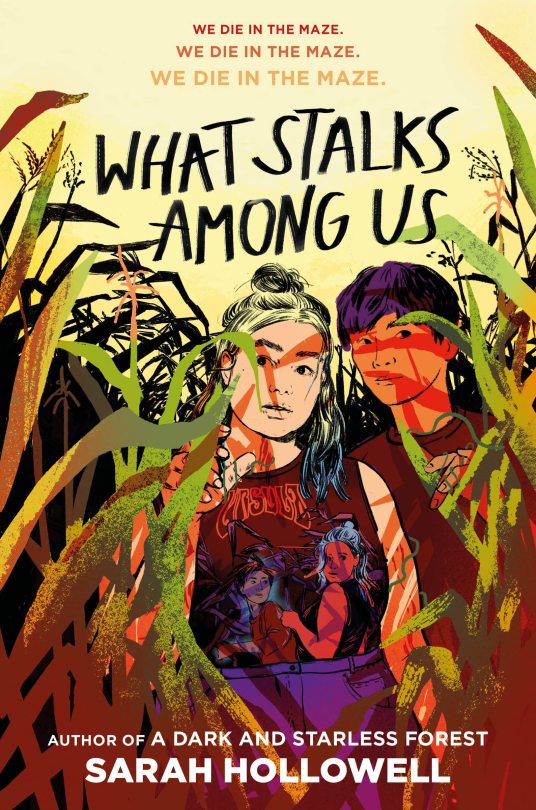
2023 reads
What Stalks Among Us
YA thriller
two best friends skip a field trip to explore some old forgotten backroads - and get trapped in a looping corn maze full of weird shit, including their own dead bodies
they have to figure out how to get out, what’s killing them, what’s causing the maze, and face their traumas
fat girl MC with anxiety, both are bi and have ADHD, no romance
#What Stalks Among Us#aroaessidhe 2023 reads#sarah hollowell#wait i just noticed it's them on her shirt on the cover...#i enjoyed this a lot!#it really immediately gets into it huh. not any build up. but in hindsight that makes sense#it gets a little repetitive in places but it works and I love how it all tied together#no romance#(it DOES explore past abusive relationships as a theme but very much just the effects of healing from that rather than showing#much of the actual relationships)#I really love how it emphasised how important their friendship is without there even being a question of it being romantic#(but also exploring that a bit re: the side character stuff in a way that I think is great)#it does make references and then explain them a lot (though also i get that could be an adhd thing with ur mind going on a tangent)#she even is like man i wish my brain would stop making all these pop culture references!#that plus a few other aspects of the writing felt a bit unsubtle - but also it is YA its allowed to be#that and a few other aspects of the writing felt a bit unsubtle - but also it is YA its allowed to be#also some of the references made me laugh LMAO. including:#'remember when you thought the maze followed crossroad rules from supernatural. do you think the maze knows about super hell'#i cannot fault someone for saying heckin wimdy because I sure do that. well not 'heckin' but#anyway felt like realistic teens#bisexual books
22 notes
·
View notes
Text
Okay! Time for a slightly longer Avengers: Endgame thoughts post!
First, I do really, really like the film overall, so let’s get that out of the way right now: I had moments of wanting to cheer, tearing up, all that, and I want to see it again immediately.
Having said that...I do have Some Thoughts, which are not 100% positive.
Spoiler warnings, obviously! Only read if you’ve seen/don’t mind spoilers!
First, the AWESOME. OH MY GOD SO MUCH AWESOME.
--STEVE IS WORTHY OH HELL YES *screams in delight* And Thor’s genuine excitement about this! So perfect!
--STEVE ROGERS STANDING ON THAT BATTLEFIELD FACING DOWN THANOS’S WHOLE ARMY. This is a brilliant Steve Rogers character moment, it’s a brilliant narrative moment, it’s a gorgeous shot visually, it’s EVERYTHING -
--AND THEN EVERYONE ELSE SHOWING UP AT HIS BACK, YES YES YES, I WANTED TO CHEER AND CRY, LOOK AT THEM ALL TOGETHER AND FORMING UP BEHIND STEVE AND “AVENGERS ASSEMBLE” AND *screams more*
--Valkyrie getting to be king! She already has ideas for change! It’s a small moment but so satisfying, seeing where she is now versus her introduction in Ragnarok.
--”AMERICA’S ASS”
--actually everything about that Steve-on-Steve fight scene, Chris Evans’ delivery of every single line, the name-drop of Bucky being what worked
--I actually really love pretty much all the time hops, and Tony going with “Howard Potts” as his alias is both hilarious and heartwarming
--Morgan! Tony being a Good Dad! 3000!
--cheeseburgers, oh god my heart, this moment actually made me tear up
--Tony’s death felt well-earned, satisfying, and in-character, and that “I am Iron Man” - oh god yes, see above about in-character and also heartwarming and heartwrenching simultaneously
--Sebastian Stan continues to be very pretty
--Thor doesn’t magically get his old pirate-angel body back - I have a LOT of other less positive thoughts about this representation, which we’ll get into in a sec - the thing is, I do like this one aspect of it, because he doesn’t need to be magically “healed” of his fatness or anything like that; he’s chubby and damn heroic and still good at being a hero, and speaking as someone who always struggles with weight, that was actually really lovely
--Paul Rudd continues to be weirdly superhumanly likeable
--Gamora’s reaction to Star-Lord
--Nebula! Karen Gillan is fantastic throughout, and so central to the storyline
--Sam taking the shield! I love this - Bucky’s tired of the fight, which Steve knows; Sam has the heart and the will, and he deserves it, and Bucky’s clearly fine with that, and I’m so excited to see Sam Wilson as Cap
--just everything overall felt so fulfilling, like, yes, this is good, thank you, MCU, thank you
The Ambivalent (sure, yeah, okay)
--Clint and Nat: I actually really like Nat’s choice and sacrifice, doing it knowingly, and it also feels in-character for her as a dedicated protector; I don’t quite get why we’re pushing Clint to the forefront so much in this movie when he’s been so absent, and I dislike the implication that he somehow has more to live for because he’s got a biological family, versus Nat’s found family
--Thor’s killing of Thanos and the “I went for the head” and also the arm - yeah, look, you learned something! But also...it really just makes you *not* doing that in Infinity War seem...even dumber. But at least you learned, I guess?
--the Girl Power(tm) moment in the final battle. You know, the super-unsubtle obvious shot. Like, part of me went YES!! and another part of me cringed because WOW, that felt...not at all organic and incredibly staged
--Steve Rogers part one: I don’t actually mind that he took a side trip and saw Peggy and got some closure. It’s a nice nod to the end of First Avenger. And I love Steve getting to retire - not die - as Cap: he can still do so much as himself, maybe art or activism or support groups or all of the above, and he deserves a chance to find out who Steve Rogers is when not Captain America. Having said that, this is ambivalent because I really don’t like how it was done. More on that later.
--I love that Harley showed up at Tony’s funeral, but at first neither I nor Awesome Husband knew who the random person even was. We figured it out, but if you don’t know, it’s really unclear
--Carol. She’s wonderful and amazing in every scene she’s in, but also...weirdly...underused. Were they afraid she was too powerful?
--maybe I’m just kinda over Chris Pratt, I don’t know, but a lot of his dialogue didn’t land right for me? Clunky. Trying too hard to be funny? Maybe.
--I don’t really understand how time travel works in the MCU, but whatever, let’s just roll with it
--Loki! Fantastic to see again, also underused, but I’m very curious to see what’s next
The Not So Positive
--ALL the Thor fat jokes. This is a big one, and it pulled me out of the movie as I was watching it, as this kept happening. It’s obviously a serious manifestation of his trauma and PTSD, and yet pretty much every single character cracks a joke, and no one actually tries to support him. I’m...not a fan of that. (Side note: having just rewatched Infinity War, there’re fat jokes there too, about Quill. Do the writers/directors have an issue with fatness?)
--after Nat dies, there’s a whole lot of scenes of Rooms Full of Only Dudes, and Primarily White Dudes, at that, directing the narrative
--speaking of, how about a memorial service for Nat?
--Steve Rogers part two. (We’ll get to Steve and Bucky in the next point; this one’s about the time travel.) Like I said above, I don’t mind him wanting to take a side trip and get closure; he deserves that. And if I’m understanding MCU time travel right, he created an alternate branch, so “our” reality still all happened and everything. So. My first problem here is that we can assume he spent that alternate reality still Being A Hero - fighting evil, saving Bucky, getting into a happy triad of Steve/Peggy/Bucky if you want to imagine that - but we’re not shown any of that. We’re shown him...suddenly pining a lot for Peggy, which feels odd anyway: part of Steve’s arc has been him finding his place in this new century and his new found family. And then we’re just shown the dance. SHOW US STEVE AS A HERO IN ALL TIMELINES, PLEASE. But I digress. If this is a branching timeline, the way Steve shows back up on the bench shouldn’t work. He shouldn’t just live through all the years and wander over to the bench at the right time, because he’s not in the right timeline for that. (Maybe there’s something we’re not shown, like him tinkering with his time travel GPS? If that’s the case it needed to be much clearer.) There’s also no particular reason he needs to get or stay old (maybe he wants to experience aging, idk?) - we’ve established that we can de-age, for example, Scott. And Steve Rogers is a stubborn kid who will always want to be able to fight whatever might be coming - even if he’s still retiring as Cap, doesn’t he want another few decades with his current family - Bucky, Sam, Clint, Morgan Stark, everybody? Now he’s...much older than everyone, physically and mentally, and I guess that can still work but...it’s going to be a whole strange adjustment for him and for everyone...but anyway, the time travel as it’s shown seems to...break their own rules, and also I don’t like how suddenly emphasized his desire for Peggy is in this film, and I don’t like having to just sort of...guess about what Steve does in that timeline. (Also, side note: why is *only* Steve returning all the stones? Wouldn’t having a partner be helpful? In case things go wrong, as things so often do? AS WE’VE SEEN IN THIS VERY MOVIE.)
--STEVE AND BUCKY. This is the other big one. We all know I am a Steve/Bucky fan, but honestly I’m not even factoring that in here. It’s not about shipping. It’s about the fact that Steve’s narrative arc, Steve’s character arc, has been so entwined with Bucky up to now - and here they barely interact. The person Steve lost - the person Steve keeps losing - is Bucky. The person Steve shares memories of couch cushions and moving in together and Sarah Rogers’ name with - is Bucky. We’ve had to the end of the line, we’ve had even when I had nothing I had Bucky, we’ve had (paraphrasing here, I know it’s not an exact quote) he said Bucky’s name and suddenly I was a kid in Brooklyn again, we’ve had all of Winter Soldier and the relevant parts of Civil War, we’ve established over and over, canonically, that Steve and Bucky save each other. Bucky knows Steve even through brainwashing. Steve fights to save and protect Bucky. They love each other. (Friends love each other. It’s okay to show that.) They sacrifice for each other. And that relationship - in a film that’s meant to be a culmination, a wrapping-up, and closure for Steve Rogers - is almost entirely absent. And I’m not okay with that, emotionally and also as a narrative choice for Steve’s arc - like, as a writer (and English professor!) myself, this legitimately bothers me. I don’t feel fulfilled and I don’t feel happy about it. Especially not - as in the article I reblogged a bit ago - when we’re given other reunions, like Tony’s joy at getting “the kid!” back, with real pathos. I know the film’s already over three hours, choices have to be made, etc. But we could’ve had fewer fat jokes and a few more seconds of Steve and Bucky interacting, y’know? I just...I don’t like it. It doesn’t feel good or right.
Okay! Those are my thoughts.
Once again, I really really like the movie overall, and overall I am left happy and wanting to watch it again. That’s true. There’re just...some things.
I may or may not attempt to write my fix-it fic. There are so many already and I’m not sure what I could add that’s new, and I think I still don’t understand MCU time travel. But I also really want to deal with some of these emotions. We’ll see.
192 notes
·
View notes
Text
there isn’t a new chapter but i feel like I should still...write things
Fool that I am, I thought that since there wouldn’t be a chapter this month, I could just quickly type up a post about some hnk things that have been on my mind, but haven’t been immediately relevant to the new chapters. Easy Peasy.
Now it’s 5,000 words later, I’ve started ranting about geology instead of my usual literary bullshit, a couple cookie recipes have snuck their way onto this word document, and the Euclase section has ballooned far beyond its original scope.
Anyway, click the read more if you want to see the following topics:
Hot takes about Euclase
I attempt to psychoanalyze Cairngorm’s fashion choices
Visual symbolism from the cover of the artbook
What type of microcrystalline diamond aggregate is Bort anyway? ft. the etymology of Bort’s name
Crazy snail theory
Since Euclase is a bit of a hot topic at the moment, I figured that I might as well expand a bit on my thoughts towards them. Somehow, I ended up writing a big ‘ol essay. Then I erased most of that essay. But there were some good bits in there, so here’s what I thought was worth salvaging. First though, I should lay my cards on the table, and explain why I’m not on team Euclase Did Nothing Wrong.
In the days following the release of chapter 71, I’ve heard a couple people say that this line:

was not translated with the appropriate nuance, and that Euclase wasn’t blatantly saying “lol, I’ve found their weakness.” However, the fact that Padparadscha regards Euclase’s words as emotional manipulation in the very next scene indicates to me that that’s still a probable reading of Euclase’s actions, even if they’re not being as unsubtle about it as the translation implies. I don’t know much Japanese though, so I can’t really comment on any translation issues that may or may not have occurred.
I think my sticking point with Euclase is that I have trouble buying that they’re acting in good faith or that they’re really committed to the ideals they’re espousing. Granted, most of what they’ve been saying and doing seems reasonable, especially compared Phos’s short-sighted flailing. They haven’t displayed any malice, and they’ve at least paid lip service to wanting positive change and demonstrating pro-social behavior.
But here’s the thing: if they truly value change, and they simply want to go about effecting positive change in a way that’s more sensible than Phos’s bull-in-a-china-shop strategy, then why are they so consistently reactionary? (I mean this in the most neutral sense of the term, btw.) They didn’t value an equitable relationship with Kongou until Phos made it impossible for the Kongou-centric monarchy to continue. They felt no urgency towards Cinnabar’s plight until they became useful in warding off the moon gems. They showed no concern for Phos’s crippling lack of self-esteem until they could use it to try and persuade Phos to defect to their side. Even though they have reputation among the other gems for being kindhearted, from what I’ve seen, they’re only ever as kind as is absolutely necessary to maintain group cohesion. The only time they’ve been considerate of someone else’s feelings in a proactive manner is with Dia, specifically regarding their issues with Bort. And since those two are the gems’ strongest non-comatose defenders, it’s prudent for Euclase to concern themselves with their issues.
Like, compare Euclase and their partner’s respective reactions to Phos in chapters 21 and 22. The story goes out of its way to show that Jade doesn’t mob Phos like the other gems, and they express concern over Phos’s insomnia. Euclase meanwhile, has no compunctions about ganging up on Phos with the others, and only apologizes when they need to ask a favor of them. I kind of expect a bit of tactlessness from the other gems, because most of them, on top of being single-minded, are implied to be pretty childlike on account of the highly static society they live in. And even those who aren’t very childlike kind of don’t have their shit together. But since Euclase has positioned themselves as wise and compassionate authority figure, that sort of thing stands out. And when they’ve cultivated a reputation among the other gems for being kind, it’s really off-putting when the narrative drops hints that that kindness isn’t sincere.
Couple all that with Padparadscha’s wariness towards them and that creepy face they made in chapter 60 and my predominant emotion towards them is
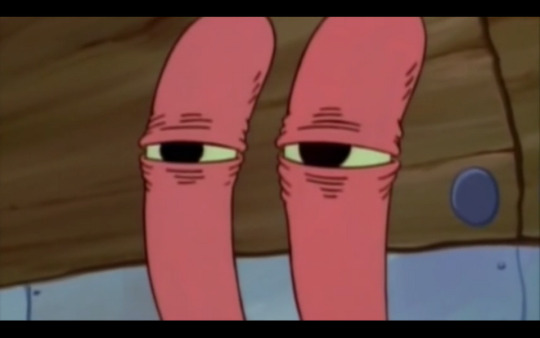
Which isn’t to say that I hate them or anything. To the contrary, I think that it’s valuable that their perspective--that of someone who is stalwartly on the ‘society’ side of the whole ‘individual vs society’ theme that the manga has going on—is a valuable one to acknowledge in the story. Furthermore, I find them to be quite the interesting character at this point. They’ve come a long way from their initial role as “that one minor character who follows Jade around.” I also find characters who are in some way secretive or two-faced to be a lot of fun because I get a kick out of trying to wade through the miasma of subtext and half-truths to try and get to the core of a character (looking at you, Craig-Greg.) Anyway, in Euclase’s case, I don’t even think they have bad intentions; but at the moment, the impression I’m getting is that they only value other people insofar as they can contribute to the maintenance of society, whatever form that society takes, rather than seeing society as something that should exist for the sake of enriching the lives of inherently valuable people. Despite the fact that Euclase is a staunch team player, I’m gonna go on record and say that I don’t think they care all that much about other people, they’ve just come to the conclusion that being cooperative and not rocking the boat as a general principle is the most rational way for them to go about their life.
If at some point in the future Euclase demonstrates that this isn’t their mindset, then I’m prepared to eat humble pie and admit that I was interpreting all their actions in the most cynical light possible and jumping to conclusions from there. But for now, I am Mr. Krabs.
Getting away from “It’s about ethics in gem society” for a moment, I suspect that, unlike a lot of the other gems, Euclase isn’t really coming from a place of willful ignorance. They’re not incurious and their words and actions have been quite deliberate. I think that they know—or have at least inferred—some truths about their world that a lot of the other gems look away from. Their oft remarked fondness for statistics might have given them insight into some discrepancies in the narratives they’ve been fed by Kongou. For example:
They’re probably well aware of the fact that no one on the moon has ever come back, and that if they themselves are captured, they’re gone for good. (According to Aechmea this wasn’t always the case; but it’s quite possible that the gems who were returned to earth and promptly recaptured lived before the gems started keeping written records as well as before any of the current characters were born.)
If we compare the number of old gems to the number of young gems to the number of middle-aged gems, it’s clear that the old group is the smallest in number, and that most of the gems who make it to old age don’t patrol often for one reason or another. Even though the gems go about their lives under the assumption that if they’re careful, they’ll never be caught by the Lunarians, that assumption is clearly not based in reality. And Euclase, who apparently knows how old each gem is down to the day, is probably well aware of how illusory their immortality really is.
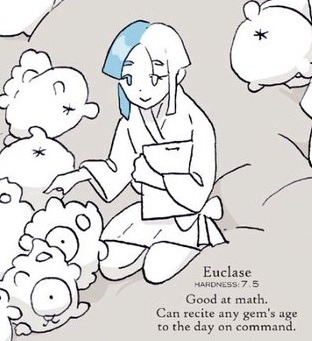
What I’m getting at is this: they’re likely one of the few gems who have wrapped their head around the concept of death, and like all the other gems who’ve come to understand that they’re not as immortal as they’ve been lead to believe, this knowledge has informed their outlook on life and their actions. But while someone like Phos has taken a carpe diem approach to dealing with the fleeting nature of life, it seems to me that Euclase responded by maneuvering themselves into a position where they never have to take risks and, thus, never need to die. As one of the little character intros mentioned, Euclase is skilled enough for any job, but the job they’ve chosen is one that apparently allows them to avoid patrolling and stay out of danger.
Something I find interesting which I expect to be brought up in the story later is Euclase’s insecurity about their brittleness, which was briefly mentioned in chapter 8. To expand on this, Euclase has three planes of cleavage, one perfect and two distinct. This aspect is actually something they share in common with Phos. Euclase, like phosphophyllite, is considered among gemology nerds mineral collectors to be a beautiful mineral that would make for great jewelry...if it wasn’t so rare and brittle. Both of them also have names that reference their brittleness--euclase means “easily broken” and the -phyll part of phosphophyllite references its perfect cleavage.
Since many of the gems have one or more aspects of their characterizations based on the physical properties and/or cultural associations of their minerals, and since breakage is a major motif of the work, I think there’s probably significance to the fact that Ichikawa decided to make a gem so thoroughly associated with brittleness into a major character. That’s how it is with Phos anyway. To paraphrase a bit, Ichikawa said in this interview that phosphophyllite’s much lauded beauty and rarity juxtaposed against its unsuitability as jewelry was the inspiration behind Phos as a character being bold yet perpetually ineffectual (and of course very, very breakable, both literally and figuratively.)
So, this character, who is shaping up to be an antagonistic(?) force has a similar—and thematically relevant—existential condition to our protagonist, and they deal with it in a strikingly different way. It’s a bit early to say where this element of the story is going to lead, but it’s worth keeping an eye on.
As I’m typing this, I’m starting to wonder if the reason why Euclase misinterpreted Phos’s words in chapter 70 as insecurity about their hardness is because Euclase themselves is insecure about their brittleness. In fact, that might also be the reason why they didn’t show themselves in chapter 70 until everyone was down and out, and why their overall plan involved shooting first and asking questions later. The chance of breaking and showing weakness—either literally or figuratively—isn’t one they want to take, even at the cost of a lot of casualties/toxic mercury spills. Additionally, when the Lunarians reported that they observed no changes in the earth gems’ behavior, Padparadscha comments that it seems like something Euclase would do, and doesn’t elaborate any further. I think this aspect of their character is what Padparadscha was getting at, that Euclase is loath to show weakness, and goes to great pains to never be the first one to blink.
Going back to chapter 8, they also talk about how the gems’ immortality predisposes them to be ignorant of danger, and how they somewhat envy the bugs and plants that can react promptly to changing stimuli. At that point in the story, it just seemed like one wistful observation on immortality among many, but looking back on it, it may have been just as much a window into Euclase’s anxieties as that line about their brittleness right after. For someone who wants to organize the world around them and dislikes uncertainty, it must be frustrating for them to imagine that some inherent aspect of their nature predisposes them towards ignorance.
To pull back a bit, I imagine that the point of making statistics Euclase’s beloved hobby is to help set them up as a foil to Phos. It’s a way to allow them insight into the flawed and tenuous nature of their society and their own existence without having them actually go out into the wide world to experience those answers for themselves like Phos does, since they’re not the type who’s willing to take risks. So unlike say, Melon or Hemi, they’re not wallowing in their comfortable yet stagnant existence because they’re willfully ignorant and simply don’t want to inconvenience themselves. Instead, they’ve spent their life running cost-benefit analyses and have come to the conclusion that they should maintain the status-quo to the best of their ability and avoid putting themselves out there. It may seem like a distinction without a difference, but I think that’s what Ichikawa is going for. Not to mention, it’d be kind of lame if everyone who decided to go against Phos and stay on earth was doing so out of incurious stubbornness or simple concern about the logistics of Phos’s plan. For one of the gems to oppose Phos due to irreconcilable differences in worldview seems a bit more meaningful to me.
So, the core of the conflict between Phos and Euclase is that Phos finds value in risking failure as a means to finding something better, while Euclase believes that if they can simply play the system forever, they’ll never have to reap the negative consequences said system doles out. This kind of goes without saying, but I don’t think the narrative is going to side with them in the end; looking at the story as a whole, I doubt that “If you keep your head down and play your cards right, you’ll be able to avoid suffering,” is a conclusion it wants to reach.
But much like the rest of the cast, Phos has forced Euclase to change. See, as much as they like to control the environment around them, they don’t like to let on that they’re doing so. To me, their blurb on this page indicates that the reason they stick to Jade and subtly direct their actions is because it allows them to micromanage everything to their heart’s content while letting someone else take on the nominal position of authority and all the attention and responsibility that comes with it.
But now that Kongou has ceded power, Euclase doesn’t have the luxury of pretending to be middle management anymore. Since no one else was willing to step up to the plate, they had no choice but to do so. And now that the gems are split in two, Euclase has been forced to publicly stand for something. Even if they’re trying to mitigate possible risks, they’re still operating well outside their comfort zone, and given that this manga is a veritable meat-grinder, it’s only going to get harder for Euclase to keep their world in order.
To sum it all up: yes, Euclase is a snake. But they’re, like, a complicated snake. A snake whose character flaws spring forth from very real insecurities. A snake who just wants to spend their days lounging on a comfy heating pad without having to worry about Actual Chaos Elemental Phosphophyllite mucking everything up.
(Ichikawa please validate my interpretation or else I’ll become Boo-boo the Fool.)
Anyway, Euclase isn’t the only character insecure about their brittleness…
Naturally, I continue to have thoughts regarding The Artist Formerly Known as Craigory. There are times where I wish I had gotten attached to a more respectable character, but honestly where’s the fun in that? I stan disasters!
I mentioned in my last write-up that the glove Cairngorm is now wearing over their left arm pretty blatantly displays their desire to cover up the part of themselves that’s prone to breaking, both metaphorically and literally. But after some thought, I’ve realized that their entire wardrobe is full of AnxietyTM. Here’s a few of my observations.
They started off their foray with avant-garde moon lingerie with a small transparent shawl which has, a month later, become a full-body veil. It seems to me, on a purely visually symbolic level, reminiscent of their situation with Ghost. Like, if I were Ichikawa, and I were looking for a way to symbolize their existential plight in clothing form, that’s how I’d do it. If I were to try to decode the meaning behind the evocative imagery, it’d be this: they’ve become trapped again, and are still being blocked from the freedom and the engagement with the world that they desire—symbolically in the sense that they’re interacting with the world through a veil, and literally in the sense that Aechmea seems to be, uh…strongly discouraging them from leaving their room, or doing things in general.
Cairn, please love yourself and get as far away from this creep as possible; I’ve got a sinking feeling that he’s going to cash in all those red flags he’s been setting off sooner rather than later.
Then there’s the matter of Cairngorm’s ongoing quest to find the Worst pair of shoes. See, Cairn started their love affair with terrible shoes long before chapter 68.

They’re not as ostentatious as say, the banana-peel crocs but…I mean look at them. These may as well be pointe shoes. Anyway, comparing these with their more recent…shoe decisions, I can’t help but think they might be a bit insecure about their height? (And in case any of you guys didn’t see it, this omake explicitly spells out that they’re shorter than the other gems.)
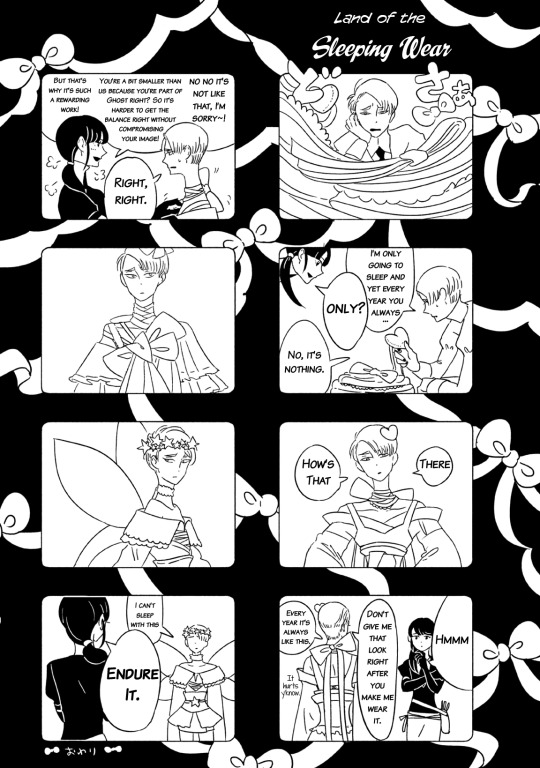
Even though they’re at most a couple centimeters shorter than the others, they seriously overcompensate for it. I think that for them, the slight difference in height is a painful reminder that they’re not fully formed like the others are, which has lead them down the path of…dreamfoam platform high-tops.
Getting back to the glove, chapter 44 contained a lot of subtext that indicated that they’re insecure about their finicky arm, and possibly about their finicky inclusions in general. The whole buildup to Phos’s head being stolen is full of dumbass decisions from both of these clowns, but on Cairn’s side, they contributed to the whole fiasco by hiding the fact that their arm had been strained past its limit, and insisting on taking down the vessel alone in spite of that fact. I’ve talked a bit before about how embracing or rejecting one’s weakness and impermanence is a major motif of this series, so the fact that Cairngorm consistently tries to hide the part of themselves that keeps breaking is…noteworthy, as is the fact that their most obvious attempt to do so in chapter 44 ended very badly.
Which got me thinking, what if that’s also why they started wearing long sleeves? It might be possible that the long sleeves on their winter uniform served the same purpose the glove does now--to cover up their left arm. We saw their bare arms in chapters 68 and 69 and it looked fine then, but what if, say, fractures appear on their left arm on a regular basis, and they wore long sleeves in order to cover it up?
To sum it all up, the aspects of themselves that set them apart from the other gems are all things that they subtly act like they’re ashamed of, and their choice of clothing reflects this.
I’ve already made a couple of posts about the cover of Pseudomorph of Love, but I felt like staring at it again and reporting my additional findings.
Something I noticed is that while the other characters’ broken pieces are placed right next to themselves, Phos’s pieces are scattered over the entire cover, usually lying on top of one or more of the other gems. I have circled them here, with my peerless image editing skills.
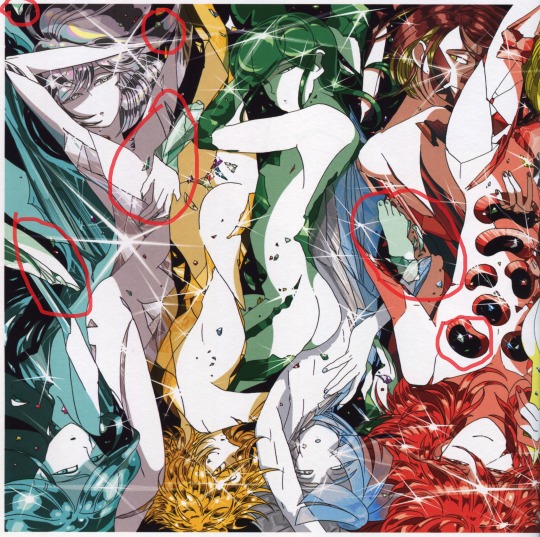
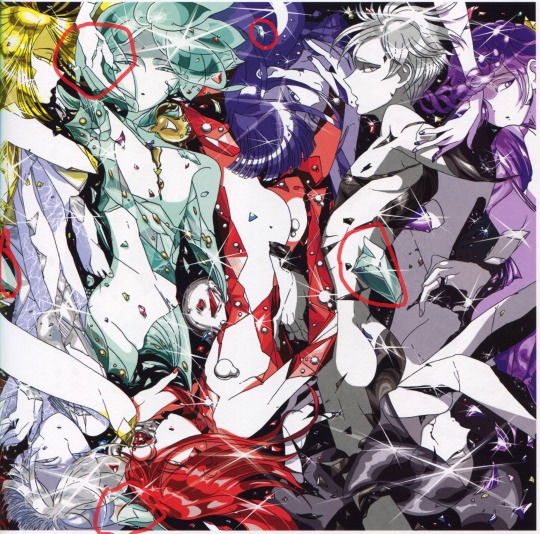
If I were to take a guess at what this visual symbolism is trying to say, I’d say it’s that by changing and breaking, Phos leaves an impact on others. At their very best, I think Phos breaks other people out of their bad habits and learned helplessness. As Phos rushes forward, they also drag others out of their personal hells, sometimes intentionally, sometimes inadvertently. Needless to say, they don’t always live up to these ideals, but that’s the general direction they’re headed in.
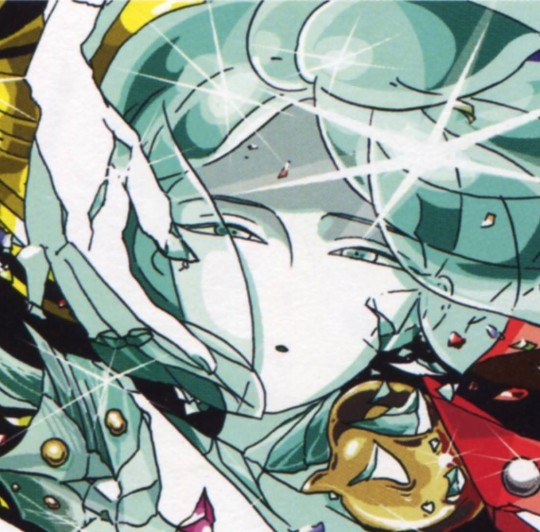
(Hey guys, do you think the fact that Phos’s hand is caressing their own face is foreshadowing that one day they will let go of their self loathing and learn to love themselves? Because I want that to be the case.)
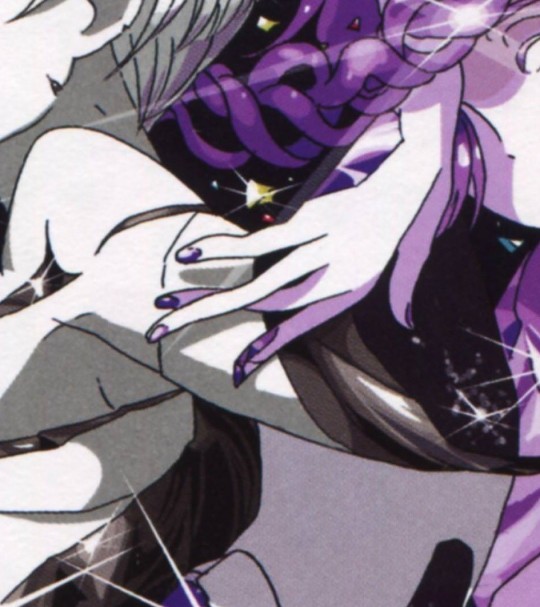
Oh, and Cairn is indeed missing The Left Arm of Conspicuous Foreshadowing here too. The break is even at the same angle. If it turns out that nothing else happens to that arm for the rest of the story then I’m going to be so embarrassed because I have gone full pepe silvia over it.
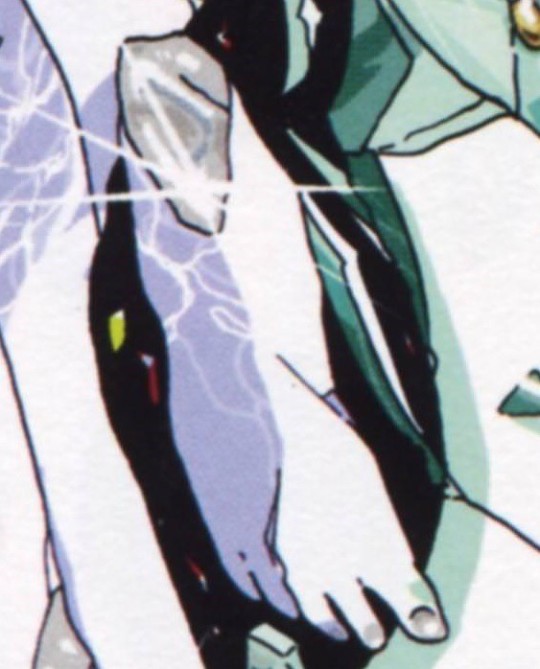
Pictured here is Ichikawa making me cry by sneaking the foot Antarc left behind into the illustration.
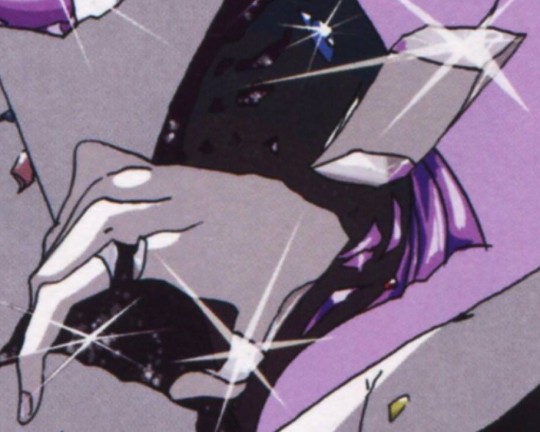
The only other gem whose parts have managed to travel across the cover is Dia, whose hand is next to Bort. And I’m sure that it’s Dia’s because it’s a right hand and Euclase’s right half is blue in this illustration, and it can’t be Antarc’s either because all of Anatarc’s pieces are overlayed with a shimmery, watery reflection. Make of it what you will.
At this point, I’m going to take off my literary hat and put on my middle school geology phase hat. Bort, how can I possibly bless your marriage to Cinnabar if I’m not sure what arbitrary classification of diamond you fall into?
So, bort is a rather ambiguous term, and can refer to basically any diamond that isn’t fit to be used as jewelry. But Bort the character is not so non-specific. They’re supposed to be an aggregate of microcrystalline diamonds, and the thing is, microcrystalline diamond aggregates are considered notable enough that they get their own names. So while the term ‘bort’ does encompass these specimens, it’s a bit imprecise.
Microcrystalline diamond aggregates can be roughly grouped into four different varieties: framesite/stewartite, ballas, carbonado, and yakutite.
Ballas, also known as shot bort, are microcrystalline diamonds with a radiating, fibrous habit that form spheres of various sizes. Despite being opaque, it sometimes displays a pearly luster depending on how heavily included a given specimen is. It ranges in color from white to gray to black.
Framesite is the name applied to most granular-to-microcrystalline diamond aggregates. It's usually black but I couldn’t find an exhaustive list of colors. Stewartite is the term for framesite that’s been magnetized as a result of magnetite intergrowths and inclusions.
Carbonado is the toughest and most mysterious form of diamond. No one knows how the hell it forms, and theories about its formation range from the transformation of irradiated hydrocarbons to supernova-genesis. These rocks are a hodgepodge of diamonds, graphite, and amorphous carbon. Carbonado is very porous and its component crystals are of a much smaller grain than either ballas or framesite. It is also further distinguished from its fellow diamond aggregates by a melt-like glassy patina that coats its surface. While most are just black, they come in a wider range of colors than other microcrystalline diamonds, including grey, red, brown or even some weirder colors like green, purple, and pink. There’s also some evidence that suggests it’s slightly harder than normal diamonds—at the very least, many a diamond-tipped sawblade has been ruined trying to cut into carbonado.
Yakutite is named for the location in Russia where it is found. It is characterized by its numerous lonsdaleite inclusions, and since it’s found in rocks that have undergone shock metamorphism, it is thought that yakutite forms via meteor impacts. So, this is pretty much the only variety of microcrystalline diamond we can rule out since I’m not seeing any meteor craters on the island.
At first I was thinking that since the inside of their hair is brownish red, and carbonado is the only one that comes in that color, they must be carbonado; problem solved!
But then I realized that the inside of Bort’s hair has never been colored that way in the manga, only the anime. In colored illustrations, the inside of their hair is iridescent like Dia’s, but with much more muted colors, so that it looks more like an oil slick or something and less like a rainbow. That could be an artistic representation of the glassy patina of carbonado, but it might also be the pearly layers of ballas. Framesite on the other hand is more likely to have a completely dull luster than either ballas or carbonado, so…one point against framesite I guess
One thing that indicates they might be ballas is how their mineral is represented in both the episode 10 eyecatch and in one of Ichikawa’s illustrations. The bort represented in these images has the spherical shape of ballas.
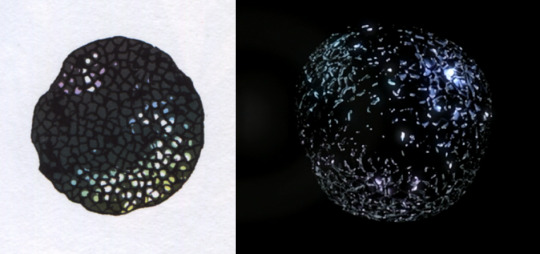
The most compelling argument for Bort being made of framesite is the fact that out of all the options here, framesite is the most likely to be referred to as simply ‘bort.’ Several sources I’ve looked at listed framesite and stewartite as being obsolete names for what is normally just called bort these days. This comes with a big caveat though.
While the scientific names of minerals are widely agreed upon and are consistent cross-linguistically, unofficial trade names are...not. For example, our Padparadscha probably wouldn’t meet the GIA’s standard for padparadscha sapphire on account of the fact that they’re pinkish-red with a bit of orange and a somewhat dark shade, rather than the GIA’s narrowly defined pastel salmon coloration. But despite the GIA’s current standard on what counts as padparadscha, they’d still meet the criteria for padparadscha found in historical literature on account of being a hunk of corundum that’s vaguely orange-looking. There are other gems in this series who exist in this gray area, but this post is getting pretty damn long so I’ll spare you poor readers the details.
What I’m getting at here is that if you look at the Japanese Wikipedia page for carbonado, bort is listed as a synonym. So even though they’re not typically used interchangeably in English, it looks like that’s not the case in Japanese. In fact, last spring this geology museum did an hnk themed event, and the rock they used to represent Bort was a hunk of carbonado, and this tweet they put out treats bort and carbonado as synonyms.
In carbonado’s corner, there’s Bort’s fight with Ventricosus. During said fight, chunks of their hair melted off from Ventri’s acid. But here’s the thing though: diamonds can’t be dissolved by acid, no matter how strong that acid is. If we generously assume that Bort losing some of their hair isn’t just a plot hole, then it may point to them being carbonado, since the graphite and amorphous carbon packed into carbonado is readily soluble in acid.
In conclusion, there is no answer and I’m slowly going insane. My mind is all out of Bort license plates. I’m leaning towards carbonado because of Bort’s galling lack of acid resistance and also because I think carbonado is a pretty cool rock.
Putting on my literary hat once again, I can’t help but wonder if the reason why Ichikawa went with the ambiguous bort over the other possible names was because of its etymology, which comes from the Anglo-Saxon gebrot, meaning fragment which is in turn derived from breótan, ‘to break.’ (A related cognate from Middle English is brotel, which became brittle in modern English.) Its cognates in other Germanic languages all seem to have meanings along the lines of ‘a break,’ ‘a rupture,’ or ‘a fracture.’ Another possible source of bort is the Old Norse brotna, meaning break. -Brot also shows up in a few other Old Norse words like Skipsbrot—shipwreck, Haugebrot—the destruction of a grave, and ísabrot, meaning oh-god-someone-please-take-my-dictionary-away-from-my-sinful-hands.
Ahem,
Out of all the possible names Bort could have had, they got one that references brokenness. I realize that this probably isn’t intentional symbolism, and I’m just shoving my interest in linguistics where it doesn’t belong, but I do think it’s a nice bit of serendipity nonetheless.
Okay, I promised you guys a galaxy-brained snail crack theory, so here goes: I’ve mentioned before that Variegatus seems to share a lot of parallels with baby!Phos, and that her name, which means multi-colored, could be said to describe Phos’s current state of being. It seems pretty clear that, on a metaphorical level, she’s connected to Phos. Well, what if that metaphor was literal, and ~somehow~ the inclusions from Phos’s arms and legs which were lost at sea ended up reborn as Variegatus, and that’s why she’s so Phos-like. The idea seems pretty absurd, but it wouldn’t be the first time Ichikawa has used someone’s body parts becoming their own sentient person as a plot device.
#houseki no kuni#land of the lustrous#*slams my face into an anglo saxon dictionary* will this help me understand hnk?
222 notes
·
View notes
Photo
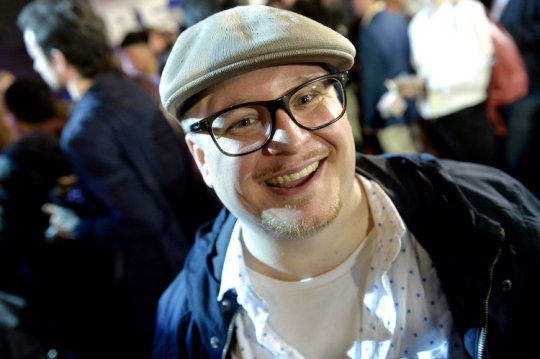
So,
Charlie Demers started off telling jokes.
The Quebecois stand-up comedian, who is known for his fierce political activism, could easily make his living performing all over North America, appearing on radio broadcasts and providing voices for animated series. But over the course of the last decade he’s also made a name for himself as a writer, producing both creative non-fiction and fiction. His latest offering is something of a departure, as he kicks off a Vancouver-based mystery series.
Literary Goon reached out to Charlie to chat about what it’s like to conjure Vancouver on the page, how his love of The Sopranos informed the work, and the peculiarities of obsessive compulsive disorder (OCD).
LG: Your new book Primary Obsessions centers around issues of mental health, which is something I know you’ve been passionate about over the years. Having suffered through a few mental health crises of my own, I’ve been able to see firsthand some of the ways the system fails to adequately treat people or reach them where they’re at. In the write-up for your book it says you’re a long-term cognitive behavioural therapy patient, so I wonder how your real-life experiences informed the narrative. Is there a political element to your prose? Are you trying to make a point?
CD: Dr. Annick Boudreau, the hero of the new series — I’ve very happy to have signed with Douglas & McIntyre for at least two books starring the character — is a fictionalized version of the cognitive behavioural therapist whom I’ve been seeing for more than fifteen years, sometimes regularly, sometimes for the psychological equivalent of touch-up work.
I mean, she’s very heavily fictionalized; symbolically I separated them from each other, in my own mind, by giving Annick a crewcut on the very first page, whereas in real life my doctor has never cut her hair. That was my signal to myself that, whatever I borrowed from my doctor for my detective, just like Chesterton used his real priest for Father Brown, Annick was a fictional character for whom I had to be free to imagine into backstories and misadventures and mistakes that my own therapist would never have anything to do with. But it is, to a certain extent, a tribute to her and a thank you — I remember listening to a poet talk once about what a unique relationship a long-term patient-therapist relationship is, and it’s so true; it’s this in some ways tremendously intimate and absolutely trusting relationship with someone you know for years, who you feel like you sort of owe your happiness and maybe even your life to, but you don’t know when their birthday is or their partner’s name or whatever.
When I first started seeing my doctor, it was as an outgrowth of treatment that began as part of free clinical trials at a university, and that treatment, which saved my life (either kept me from taking it, or made it something other than just sheer torture) was free, and it was at a time when I didn’t have a cent to my name, I mean absolutely nothing, and knowing how many versions of me are out there right now, at this crucial point in their psychological development in their early 20s, and they can’t access the kind of treatment that saved my life, it just murders me. Psychiatry is fine for certain things and for certain people, absolutely — and I have had good experiences, and bad ones, with meds. But for OCD, it’s cognitive-behavioural therapy. I mean, in my experience, for sure.
And that should be part of universal health care. I don’t know how saliently that point comes through, though, in the novel, at least this first instalment. If there’s a politics at play here, I think it’s probably less to do with bread and butter stuff like that, and more to do with the flattening effect of the Internet. In this story, Annick Boudreau is drawn into an investigation to save her patient because she knows things that other people don’t know, even though they think they do.
LG: I’ve never met anyone who is as passionate about The Sopranos as you are. I read your moving tribute to James Gandolfini when he died, and couldn’t agree more that David Chase’s depiction of the realities of talk therapy was ground-breaking in a covert way. People thought they were watching a show about gangsters, but they were really watching a show about mental health. With this book steeped in a crime milieu in the same way, would you say that your goals align with his?
CD: If David Chase is Stevie Wonder, I’m a ringtone of dogs barking “Jingle Bells”. Even thinking of comparing my book to The Sopranos feels like comparing Brueghel’s “Landscape With the Fall of Icarus” to a calendar from the mechanic’s because they both hang on walls. I’m perfectly happy to have written what I think is a fun, smart, and from a certain angle even possibly a little enlightening detective story in the fish-out-of-water tradition. There’s a whiff of gangster underworld in this book, and there’ll be a lot more of it in the second one.
LG: One of your main characters has been diagnosed with Obsessive Compulsive Disorder, which is often mis-portrayed in popular media. (I’m thinking about the Academy Award-winning Jack Nicholson flick As Good As It Gets.) As it happens, your hero Dr. Annick Boudreau sets out to help him but quickly realizes that doctor-patient confidentiality creates a roadblock where she can’t speak to the authorities. Most people think of doctor-patient confidentiality as a positive thing, but it sounds like you’re exploring it’s unexpected down-sides. Did you have an experience that clued you into this conundrum?
CD: There were bits of As Good As It Gets that showed some of the real agony of certain strains of OCD, but it definitely slotted into the broader cultural misunderstanding of OCD as meaning “super finicky” or “very particular.” The initialism itself, OCD, has been almost completely stripped of its descriptive power, since in common speech it’s almost always used to mean someone keeps a clean house or likes things a certain way — though usually if you say ‘obsessive-compulsive disorder,’ people know you mean an actual, clinical diagnosis.
The patient in the novel has the kind of OCD that I have (though I should say, thanks to the real life “Dr. Boudreau,” have mostly put behind me), which is called primary obsessions OCD, and involves repeated, unwanted, intrusive and disturbing thoughts. Heavy on the ‘O,’ a bit lighter on the ‘C,’ although the thoughts can cause so much emotional pain, anxiety, and even trauma that very complex, time-consuming, and exhausting compulsions and rituals develop to “deal with” or neutralize them. It’s not so much that there’s a down-side to doctor-patient confidentiality, which is a sacred and absolutely essential norm — but there are particular legal strategies to bringing in a defendant’s psychologist, and trying to include their insights. And in this case, Dr. Boudreau’s patient’s shame — which I can say, from experience, is debilitating to the point of paralysis until you’re pretty well into your treatment — becomes an obstacle to his own well-being.
LG: I grew up just outside of Vancouver, but rarely got the chance to see it portrayed in fiction. Though it’s used by countless film crews, it’s always disguised as some other American metropolis. Recently I read The Plague by Kevin Chong, and I was fascinated to see how his portrayal overlapped with my own experiences, and also how it diverged from them. When you set out to conjure Vancouver on the page, what were your priorities for setting the scene? Which aspects of Vancouver were crucial to capture?
CD: One of the things I love about the detective genre is the way it’s so, so often and unapologetically about the worst and best things about the cities in which the stories are set. I’m a huge fan of the late Andrea Camilleri, and his Detective Montalbano books, and as you read about his “Vigàta,” in Siciliy, you really can’t tell if this place is Heaven or Hell. So I was very unsubtle about splashing as much Vancouver on everything as I could.
One of the nice things about having a psychologist for a protagonist is that she’s rich, so I could realistically give her access to every part of Vancouver, without any particular anxiety about it. But unlike Dave Wakeland, my pal Sam Wiebe’s private eye, she didn’t grow up here — Annick is an Acadian from Halifax, so Vancouver’s not in her bones like it’s in mine, or Dave’s, or Sam’s. Sam’s incredible books are already doing the work of capturing the city’s loss of soul, and it felt stupid for me to try to ape that, and so I kind of mostly went with a lights-and-make-up Vancouver. Any East Sider will recognize many barely-disguised eateries and for sure there’s some inevitable urban grit, but I also went with the Pan Pacific lounge and Coal Harbour condos because hey, fuck it, it’s fiction.
The Literary Goon
0 notes
Text
Are you a loyal anime fan? Do you stand by those shows which have brought you joy?
Lately, I’ve read a few think pieces on how people’s preconceptions can colour our enjoyment of a show. How going into an anime with preconceived notions or expectations based on other people’s experiences, inevitably affects what we end up getting out of our watching experience. But what about the reverse case scenario.
it’s a reverse harem!
Have you ever stumbled across a title you’d never heard of before and thoroughly enjoyed, only to discover that your hidden gem is widely reviled by the anime community? Do you remain faithful to your new love or do you disavow it? Are you suddenly ashamed to admit you enjoyed the show? Do you go as far as downgrading it in your own mind, admitting to yourself that is was indeed riddled with flaws, or do you feel compelled to defend it against accusations you don’t really believe are true?
What if you thought a title was really so-so but endlessly see it described as a classic, a masterpiece, an undeniable work of art? Do you pretend to like it? Do you add it to your top 10 lists just to fit in? Do you avoid giving any opinion or at least try to soften the blow with excuses like: “I was really young when I saw that”?
I know I do.
It’s stupid of course. I end up getting nonsense recommendations for new shows because it’s based on skewed data. Or I find myself sitting through movies or shows I know I won’t enjoy because I somehow didn’t manage to scrape together the microscopic amount of courage required to admit that I don’t like a particular director or studio. On the flip side, I also can’t gush over whatever silly, stupid little show is making me super happy at the moment because I’m afraid people will judge me. Despite the fact that I know no one cares about my anime tastes, at least not enough to actually have them affect their opinion of me.
yes, yes tell me more of this awnimou you like so much – everyone I know
I want to watch shows I like – and I want those types of shows to get made, but people won’t know that unless I tell them. So? Well…As my own feeble attempt at some kind of earnestness, I give you my top 9 animes I’m either ashamed of liking or embarrassed of not getting. Let’s all celebrate our lack of good taste together!
In random order:
😊 The Royal Tutor
I’m not as stupid as I look. I realize this show is just a lighthearted excuse to bring together a flock of beautifully drawn bishies and cash in on the hormonal audience ready to devour it. The animation is minimal, the historic setting is laughable and characters and storyline are all more or less surface level but that’s not what this show was for… It’s paced well, the easy humour may be uninspired but it’s familiar and comforting. What it did do, it did well. The pretty pretty characters are super likeable for all their lack of developments and by golly I would watch another season the second it came out. I would leave work early and everything.
☹ Sakamoto desu ka
When this show came out there was so much hype, even I heard of it. This was recommended to me by just about everybody – the one friend that watches anime, blogs, youtubers even MAL. Everyone told me that this is comedy gold – one of the most hilarious shows to come out in recent years and well, I didn’t get it… My sense of humour is important to me, it’s the one quality I’m actually proud of. I am quick with a laugh and need very little to find the funny in a situation and although Sakamoto wasn’t bad I just didn’t find it that funny and ended up dropping it after 6 episodes or so. I’m very worried that I’m growing dull.
😊 Black Butler II
Black butler, in all its iterations, has long been a guilty pleasure of mine. I am honestly ashamed of liking this show so much. It’s just sooooo emo and gothicky and teenage angsty and I love all of it. At least it’s fairly popular except I’m a black sheep even among Black Butler fans because my clear favourite is season 2. Most fans will stop talking to me at this point, I understand. But, I adore Alois, I think he’s the perfect embodiment of the cheesy gaudy charm that BB brings to the table and the sarcastic ending was the best. Soo yeah – I’m a lost cause.
☹ My Teen Romantic Comedy SNAFU
People love this show, I see artwork from it all over the place and I will admit it’s quite pretty. It also has the word SNAFU in the title which is automatic extra points in my book. But everything else never resonated with me. The comedy fell flat, the drama felt fabricated the pace was off and the characters were irrational. I fluctuated between bored and depressed throughout most of it yet still felt the need to watch both seasons, waiting for it to finally pick up. It did not. I did like the orange haired girl’s front cross strap bra thingy….
😊 Alien 9
OK – I can’t explain this one. It’s a mess of a show but I lurve it so much. One of the few series I’ve both watched and read and reread. I could defend it to you guys. The intriguing parasitic/symbiotic alien aspect with a sort of magical girl deconstruction feel. The jarring violence and real suspense but in all honestly even those high points aren’t fully realized. I can’t tell you why it’s better than people think it is but it is. I’m going to go watch it right now.
☹ Azumanga Daioh
I like the Slice of Life and Comedy genres quite a lot (although looking at this list, maybe I don’t?) and Azumanga Daioh is considered by many, a classic. The intro should be! It has its moments to be sure but I just didn’t find it that funny. That aside, what really put me off was the use of a teacher’s predatory and continual sexual harassment of students as a running gag. The show treats it as cute and funny that an adult teacher is clearly trying to grope or see his students naked all the time. I’m afraid that I’m being a stick in the mud or that I somehow missed the distinction between ridiculing bad behaviour rather than humanizing it, but it always skived me out and I just couldn’t shake the feeling. Apparently, I’m the only one who has a problem with this. This scene always made me laugh though:
youtube
😊 Cheer Boys!!
I’ve written a post about this unsubtle cash grab of a show and how I can’t seem to hate it. In fact I’ll just say it, I really like it. It’s indefensible so I won’t even try to but sometimes we just want empty calories. This show won’t bring anything new. There are so many better sports animes out there and you should watch them all before this one. But once you’re done with all the “good” shows….
☹ Spirited Away
Yes, yes, I know – Ghibli, yes genius, yes Myazaki, yes I think he’s really hot, yes this movie is brimming with wonder and charm… I can see the quality but, I mean, so what? Do I remember anything about Chihiro as a person? About any character at all? I don’t, they just didn’t leave a mark on me. I can clearly see the images of what people and things looked like but they have no personalities beyond that for me. I would show this to a small child or an animation student who wants to admire the technical know-how and maybe I should rewatch it. I just didn’t find in it the depth or meaning of earlier titles like Mononoke or the graceful ache of Totoro and I would write more except I don’t remember anything about it…
😊 Cute High Earth Defense Club Love!
Let’s end it on a happy note. Eminareviews named this as the anime she was embarrassed of liking and it suddenly dawned on me that maybe I should be embarrassed too. Sure, the jokes are super easy and the premise is paper thin but what can I tell you guys, this show had me smiling from start to finish. I realize that given the fact that Shinji Takamatsu (of Daily Lives of High School Boys and Gintama fame) was behind this, expectations may have been sky high for some and disappointment was inevitable. I also see that the writers went for some low hanging fruit here, and that they would have been capable of much subtler and more cutting humor but just because it’s a little lazy doesn’t mean it’s not funny. Season 2, now that was not funny….
This is one of the disadvantages of wine: it makes a man mistake words for thought
Suggested drink: Confidence Builder, alternatively you can throw it in the other person’s face but that would be such a waste…
Every time someone tells you your favorite anime is derivative – drink
Every time some says “I use to like that show before I knew more about anime” – drink
Every time someone gets real nitpicky about an unimportant aspect of your favourite show, like the color palette for example – drink
Every time someone says you should what X instead – it’s so much better – drink
Every time someone tells you, you’ll get it when you learn a bit about… – drink
Every time someone tells you the manga was better – drink
Every time someone says, well I’m more into story driven narratives – drink
Every time someone tells you it’s a poor man’s version of… – drink
Every time someone accuses your show of being cliché – drink
Every time someone accuses your show of being pretentious – drink
Every time someone says aren’t cartoons for children? – go home

Anime confessions Are you a loyal anime fan? Do you stand by those shows which have brought you joy?
#Alien 9#anime#Azumanga Daioh#Bad idea#Black Butler#cheer boys#Cute High Earth Defense Club Love!#Essays#Guilty pleasure#Lists#sakamoto#snafu#spirited away#The Royal Tutor
0 notes